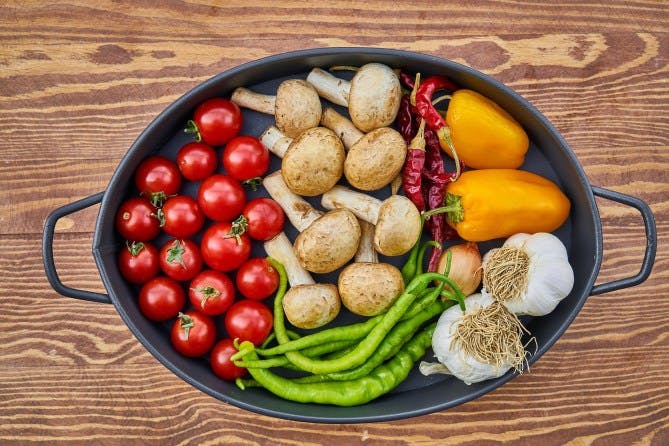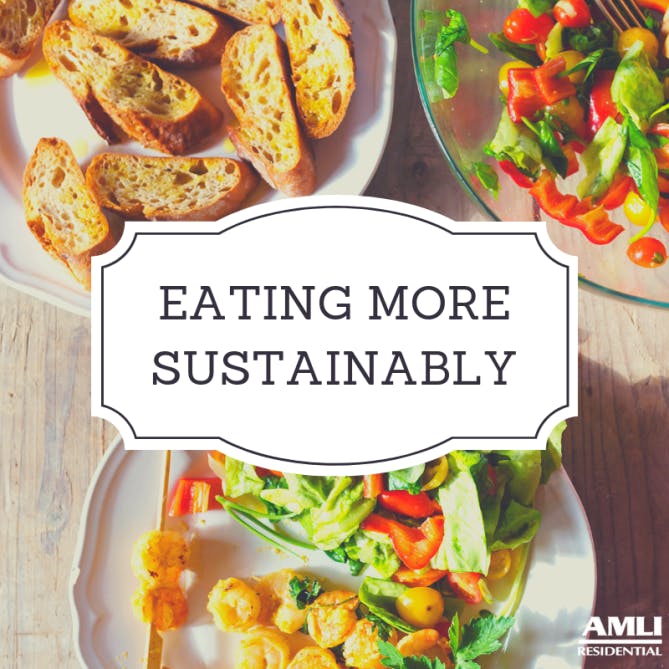As more and more people are hopping on the bandwagon and working towards healthier lifestyles, many are transitioning towards cooking and eating more sustainably as well. But what does that mean? Simply put, sustainable eating is about choosing foods that are healthier for not only our body but also the environment. Rather than consuming processed foods you may see at the supermarket, sustainable eating focuses more directly on plant-based and fresh, wholesome options. In this article, we’re going to break down the benefits of sustainable eating and how simple changes in your eating and cooking habits can create a happier and healthier style of living.
Benefits of sustainable eating
Health
Sustainable eating can do wonders for your overall health. With a heavy focus on foods such as whole grains, legumes and fresh produce, you’ll be consuming more nutrients, vitamins and antioxidants compared to what you were eating before. Eating sustainably can aid in lowering cholesterol levels and can decrease your risk of certain cancers. Likewise, having a diet full of options such as fruits and vegetables can aid in weight loss or weight management, as well as increasing your energy levels over time.

Environmental
Look for foods that minimize damage to the environment during growth and production. Sustainable foods will aid in environmental health by improving soil health, cutting down on fuel costs and minimizing pesticide exposure. According to Earth Easy, “over 4.5 billion pounds of pesticides are used each year, with 75 percent used in agriculture and 25 percent in homes and gardens.” Not only are pesticides potentially harmful to our health, but contaminates soil, water and other forms of vegetation. By lessening the number of pesticides used through sustainable eating, you can help in minimizing the potential hazards associated with them.
Economic
More often than not, people associate healthy eating with a higher price tag compared to unhealthy options. However, eating sustainably can actually help your wallet, rather than hurt it. Instead of dining out or ordering takeout for lunch, try cooking at home and brown bagging it to work. Additionally, buying foods local to your neighborhood can automatically assist in saving you money, since there will be no transportation cost to cover if you were to buy from a supermarket. And if you’re interested in growing your own food? Even better! You’ll have more food for less money. Although there may be some adjusting as you transition to sustainable eating, it can be done so in a way that is economically beneficial to you.
How to start
Shop local
Heading over to your local farmer’s market is one of the easiest ways to begin eating more sustainably. Not only can you be sure that the foods you are buying are fresh, but you’ll be able to talk to your fellow shoppers and maybe the sellers themselves to learn new recipes and methods for cooking. And since the items you find at the farmers market aren’t going through the process of being packaged, shipped and sent hundreds of miles to the grocery store, you won’t need to worry about your fruits and vegetables losing any flavors or nutrients.
Eat more plants
Eating more plants is healthier for your mind, body and planet—simple as that. And not only can eating vegetables add a wide variety of flavor to your dishes, it also serves as a great way to add some color into your meals. The best part? There are so many different ways to prepare your vegetables that you’ll never become bored with the flavor. Options include grilling, steaming, baking…you get the idea.

Reduce food waste
When it comes to eating sustainably, it’s important to reduce the amount of food waste within your home. Although you may think that the food you throw out will quickly decompose, the majority of the time it will end up in a landfill somewhere. Instead, make sure to utilize your leftover scraps by saving it for another night or composting your leftovers to create nutrient-rich soil. Wondering what you can compost in your apartment? Check out the list below:
- Fruit and vegetable scraps
- Eggshells
- Coffee grounds
- Tea bags
- Cooked pasta
- Cooked rice
- Stale bread
Additionally, reducing your food waste can be as simple as only buying what you need from the store or farmer’s market. Before heading out to do your weekly food shopping, plan your meals out and determine what ingredients your dishes call for. Not only can this aid in creating healthier meal choices, but it will minimize your scraps and save you money!
Opt for grass-fed meat
For those of you who crave a rib eye or sirloin every once in awhile, we recommend looking for grass-fed meats the next time you’re out food shopping. Grass-fed meat includes a regenerative grazing system, where cattle graze closer together for shorter periods of time. This allows for the grass and soil to regenerate and can aid in restoring soil organic matter. Not to mention, it tastes good!

Grow your own food
Can’t get much more sustainable than growing your own food! Not only can growing your own fruits and vegetables save you money, it’s a great way to lower your carbon footprint. If you don’t have the time or space to tend to a full garden, start small. Simply begin by adding pots to your patio or windowsill and start with items such as tomatoes, peppers and herbs.
In the end, eating sustainably doesn’t have to be difficult. Making small changes and being more conscious of what you’re consuming will lead you to an improved lifestyle in no time. Sustainable eating comes with all the economic, health and environmental benefits that you’re sure to appreciate. So, give it a go!
Interested in more blogs like this? Keep up with the AMLI blog!



 View All Posts by Krystyna Dudka
View All Posts by Krystyna Dudka